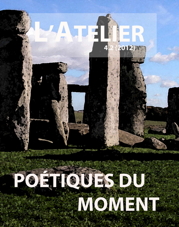Wallace Stevens: A Study in Vesperal Poetics
Keywords:
Stevens, WallaceAbstract
Starting from Wallace Stevens’ definition of analogy as restatement, this paper explores his poetics of variation as he puts it to work at that specific moment called “An Ordinary Evening in New Haven.” For all its attempts at theorizing “reality,” what emerges from Stevens’ broodings on the interactions between the objective world and the imagination primarily pertains to the slippery truth of desire posing as philosophical truth. Evening, therefore, is not a time of gathering and synthesis: it is only a fragment of a “never-ending meditation” placed under the aegis of the revisionary trope of correctio—an emblematic trope since much of Stevens’ poetic philosophizing relays and amplifies the premise of of the Lacanian master’s discourse, i.e., that “there is oneness.” As this article argues, however, Stevens’ poem does not simply build upon but also exposes the fantasy constructs this discourse reflects. Thus while various avatars of complementarity are explored and the imaginary possibility of closure is constantly reasserted, much of the poem’s dynamic stems from its resistance to the reader’s desire for closure, favoring instead modes of incipience and unfulfilment that the Stevensian notion of “plainness” encompasses. This explains the tension at work throughout much of the sequence between the assertion of mastery inherent in the poet’s frequently aphoristic turns of phrase and the reduction of Stevens’ adagia to the mere form of legality—an empty shell allowing the voice of the imperative to resonate.
A partir de la définition stevensienne de l’analogie comme reformulation, il s’agit ici d’explorer la poétique de la variation qu’appelle ce moment particulier que désigne le titre “An Ordinary Evening in New Haven”. Quoiqu’elle s’efforce selon diverses modalités de théoriser la “réalité”, la méditation poétique sur l’interaction entre objectivité et imagination vise d’abord la vérité fuyante du désir qui se présente sous les dehors de la vérité philosophique. Aussi le soir, loin d’être le moment du rassemblement et de la synthèse, n’est-il qu’un fragment d’une “incessante méditation” placée sous le signe de la correctio, figure de la révision emblématique de ce qui, dans la poésie philosophante de Stevens, relaie et amplifie la prémisse selon laquelle il “Y a d’ l’Un”, formule du discours du maître selon Lacan. Pour autant, le poème de Stevens ne se fonde pas simplement sur les fantasmes dont relève ce discours, mais les expose tout aussi bien. Ainsi, alors même qu’il égrenne divers avatars de la complémentarité et ne cesse de réaffirmer la possibilité imaginaire de la clôture, sa dynamique tient à la résistance qu’il oppose au désir de clôture suscité chez le lecteur, le texte privilégiant au contraire l’esquisse et l’incomplétude, qui relèvent toutes deux de l’ “ordinaire” stevensien. D’où la tension à l’œuvre dans la suite poétique, entre affirmation de maîtrise par le biais des tournures aphoristiques que le poète affectionne, et réduction de la maxime à la pure forme de la légalité, coquille vide au creux de laquelle résonne la voix qui légifère.
Published
Issue
Section
License
- Work submitted for publication must be original, previously unpublished, and not under consideration for publication elsewhere. If previously published figures, tables, or parts of text are to be included, the copyright-holder's permission must have been obtained prior to submission.
- Authors of accepted manuscripts will assign to L'Atelier the right to electronically distribute their article, or publish it in any form (Internet, CD ROM, printed copy) but authors will retain copyright and, after the article has appeared in L'Atelier, authors may republish their text (in print and/or electronic form) as long as they clearly acknowledge L'Atelier as the original publisher.


